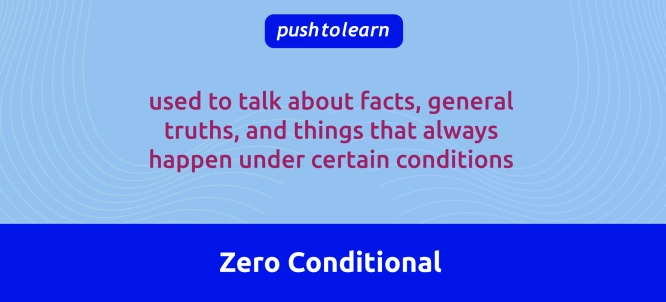by PushtoLearn
Zero Conditional
Table of Contents
Zero Conditional Exercises
These exercises focus on Zero Conditional
TLDR
✔️ Zero Conditional = Facts & General Truths (If + Present, Present)
✔️ Use "when" instead of "if" if the result is always true
✔️ NEVER use "will" in the Zero Conditional!
✔️ Great for science, facts, and rules

What Is the Zero Conditional?
The Zero Conditional describes:
✔️ Scientific facts → "If you heat water to 100°C, it boils."
✔️ General truths → "If you don’t sleep, you feel tired."
✔️ Rules and instructions → "If the light is red, you stop."
📌 Fun Fact: The Zero Conditional is 100% certain—the result always happens!
Zero Conditional Structure
👉 If + Present Simple, Present Simple
✔️ Examples:
-
If you mix red and blue, you get purple. (Fact)
-
If it rains, the ground gets wet. (General truth)
-
If the sun sets, it gets dark. (Natural law)
📌 Tip: The "if" clause describes the condition (Present Simple), and the main clause shows the result (Present Simple).
Variations of the Zero Conditional
🔹 Using "when" instead of "if"
✔️ When you eat too much, you feel full.
✔️ When the temperature drops, water freezes.
📌 Tip: "If" and "when" are often interchangeable in the Zero Conditional because the result is always true.
🔹 Using the imperative in the result clause
✔️ If you feel sick, see a doctor.
✔️ If the alarm rings, leave the building.
📌 Tip: This is common for rules and instructions.
Zero Conditional vs. First Conditional
|
Feature |
Zero Conditional |
First Conditional |
|
Meaning |
Facts & general truths |
Future possibilities |
|
Tense |
If + Present Simple, Present Simple |
If + Present Simple, Will + Verb |
|
Example |
If you touch fire, you get burned. |
If you touch fire, you will get burned. |
|
Certainty |
100% certain |
Possible, not certain |
|
Can "if" be replaced with "when"? |
Yes, because it’s always true. |
No, because the future is uncertain. |
📌 Tip: If the result always happens, use the Zero Conditional. If the result is possible but not certain, use the First Conditional.
Common Mistakes in Zero Conditional
|
Mistake |
Incorrect |
Correct |
|
Using "will" in the Zero Conditional |
If you heat ice, it will melt. |
If you heat ice, it melts. |
|
Using the past tense |
If you ate too much, you feel sick. |
If you eat too much, you feel sick. |
|
Using "would" instead of the present tense |
If you press this button, the machine would stop. |
If you press this button, the machine stops. |
📌 Rule: NEVER use "will" in the Zero Conditional—the result is a fact, not a future event.
Compare other Conditionals: First Conditional, Second Conditional, Third Conditional, Mixed Conditionals.
FAQ: Common Questions About the Zero Conditional
Can I use "will" in the Zero Conditional?
➡️ No! The Zero Conditional describes facts and general truths, which don’t need "will".
❌ If you heat ice, it will melt.
✅ If you heat ice, it melts.
Can the Zero Conditional use "when" instead of "if"?
➡️ Yes!
✔️ If you mix red and yellow, you get orange.
✔️ When you mix red and yellow, you get orange.
Can I use the Zero Conditional for giving instructions?
➡️ Yes! You can use an imperative in the result clause.
✔️ If the alarm rings, leave the building.
What’s the difference between Zero and First Conditional?
➡️ Zero Conditional = 100% true
➡️ First Conditional = Possible future
✔️ Zero Conditional: If you eat too much, you feel sick.
✔️ First Conditional: If you eat too much, you will feel sick.
What’s the biggest mistake learners make?
➡️ Using "will" after "if"!
❌ If you will eat too much, you will feel sick.
✅ If you eat too much, you feel sick.

